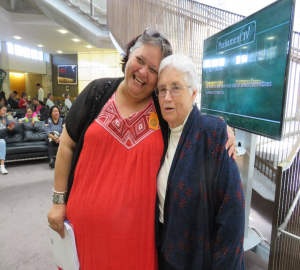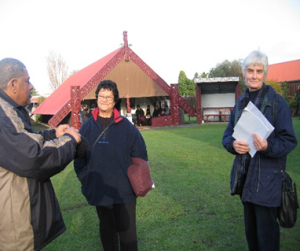The Waitangi Day Act 1960 declared 6 February to be Waitangi Day
Waitangi Day is a national holiday of thanksgiving in commemoration of the signing of the Treaty of Waitangi. The Treaty is regarded by some Māori as ‘He Taonga Tapu’, a sacred covenant, a bond with spiritual connotations between peoples, involving obligations on both sides. The relationship between Māori and the Crown has been described by Sr Makareta Tawaroa rsj, Nga Paerangi, as similar to Lazarus and Dives. (Luke 16: 19-21)
Aotearoa has been occupied by Māori for a very long time and the ancestors worked out ways to integrate relationships with Papatuanuku, (Earth) and all peoples. By 1800, regular trading visits by Europeans led to the first tiny coastal settlements of whalers, sealers and traders, under the protection of local hapū [a number of whānau (extended families), the most significant political unit in Māori society]. By 1840, the Māori population had reached 80,000. The Settler population was about 2,000.

In the British-styled constitutional system, treaties were made by ministers of the government and not by parliament. They wanted to transfer sovereignty to the Queen, intended to create a framework to protect Māori and settlers from colonising interests. The English and Māori versions of the Treaty were different. The Māori version, signed by the chiefs, stated that Victoria, Queen of England, “desires to preserve to them their chieftainship, rangatiratanga (sovereignty) and their land; and that Māori of New Zealand may consent to the government of the Queen over all parts of this land and the Islands.” Māori, therefore, ceded kawanatanga (governance) to the Queen, not sovereignty.
In Aotearoa there has been on-going efforts by Māori for self-determination. Their efforts have been supported by Pakeha, (settlers) who wish to ‘Honour Te Tiriti’.

Waitangi Day 2021 organisers, are being asked to plan for different coronavirus alert levels. There will be Māori cultural performances and speeches from Māori and New Zealand dignitaries. Throughout the country, many festivals and concerts will be held in urban centres, and re-enactments of the signing will be performed to educate people of all cultures, about the Treaty which gives us all the right to be here.
Since 1880, Sisters of Saint Joseph, Aotearoa, have been stirred to walk alongside Tangata Whenua, (the people of the land), in a spirit of partnership. We clearly see that promises and guarantees made in the signing of the Treaty of Waitangi have been broken. Māori long for the restoration of right relationships with creation and themselves. It is our moral obligation to work towards the same goals.
Noelene Landrigan rsj
Photos provided by Noelene Landrigan rsj. Used with permission.
